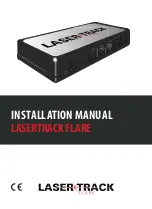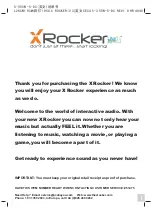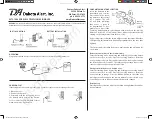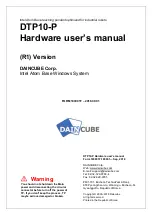
1
Testable surface sensor for moving
operation on automatic door systems
Always consider the safety functions of your application as a whole, never
just in relation to one individual section of the system.
The sensor may only be operated in the aluminium profile provided for this purpose.
Parts of the sensor may become hot during operation.
The installer is responsible for carrying out a risk assessment and installing the
sensor and the door system correctly.
Start-up
2.1
Mounting the aluminium profile
Aluminium profile
Sensor (US beam)
End cap 2x
Front cover
Bearing clamp 2x
Screw terminal
(not visible in figure)
Translation of the original instructions
Recommended start-up sequence:
I.Mounting the aluminium profile, II. Connect, III. Mounting sensor/cables, IV. Adjusting the angle, V. Initialisation
Safety instructions
1
General
Connect
2.2
2.
Mounting sensor/cables
The start-up procedure below covers virtually all applications. However, you may have need of a particular setting not described here. In this case, please refer to your application
documents and to the table found in chapter 3 of these instructions; alternatively, you can contact our product specialists.
Electrical connection
I
II
III
Observe the national and international regulations on door safety.
Never touch any electronic or optical components of the sensor.
Only trained, qualified personnel may mount and start up the sensor.
The unit may only be opened and repaired by your supplier.
The unit may only be operated from a safety extra-low voltage (SELV)
system with safe electrical isolation.
If the front cover
breaks, there is a risk it may shatter.
M
o
u
n
ti
n
g
t
h
e
p
ro
fi
le
ENGLISH
1
2
3
4
5
6
common
nc
no
Test input
2
2.3
Mounting the optical unit
1. If the profile
does not have any mounting holes, make
some in the rear of the profile and mount it so that it is hori-
zontal (use a spirit level). Important: The aluminium profile
must lay
flat
against the mounting surface.
2. If the front cover
has been supplied by metre
and needs to be cut to size, lay it on a
flat, clean
surface
and cut it using a
fine tooth hacksaw,
a metal cutter or a rotary tool
(with an appro-
priate attachment), without applying any pressure.
To attach the cover following start-up: 1. remove
protective foil 2. Insert the cover
, 3. Click the
cover into place.
1.
3. Affix the end caps after attaching the cover.
Affix the end caps
with alignment pins
on the profile side. Optional: Affix the end
caps with screws for reinforced fixation.
Therefore pierce through the drill-hole.
Sensor
b must be rotated by 180° and
mounted.
A
B
C
D
2°
2°
14°
2°
14°
2°
2°
14°
2°
14°
b
Rotate by 180°
To do this, rotate the mounting clips
on the sensor
(in the sequence A, B, C, D).
2°
2°
14°
2°
14°
2°
2°
14°
2°
14°
b
The buttons red and green on the optical unit must be
mounted onto the corresponding door edge.
Check the function of your entire door system in relation to the applicable safety standards (e.g. EN 16005) and EU regulations.
Cable to door controller
Notes on wiring:
Wiring according to the requirement of the door system
1. Pull screw terminal
out of the sensor to be connected to the door controller
(= master sensor).
2. Perform wiring in accordance with the door controller specifications.
3. Once the plug terminal has been wired, re-insert it into the sensor.
Connection diagram for individual sensors
Attention! Connection scheme is illustrated powered off
In standard relay is powered (passive)
NC = Use connection 5 (NO)
If AC voltage is supplied, only single sensor operation is possible and it is
not allowed to cascade the sensors by ribbon cable. Always use ferrules
when wiring (recommended core cross-section 0.25 mm
2
).
For a both-sided protection of the door, it is recommended to us the optional
Y-Adapter (288879).
Master/slave wiring
Master/slave wiring using enclosed ribbon cable. A maximum of 3 additional
slave modules can be added in this way.
buttons
256283W
01/17
Uni
Scan






















